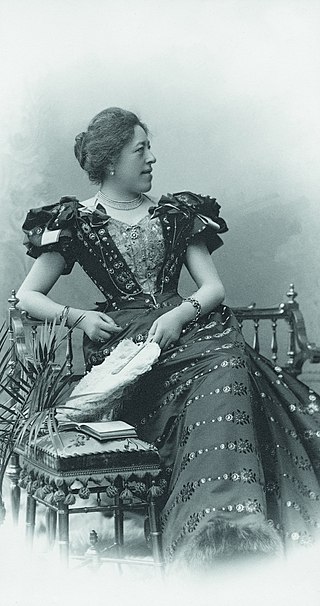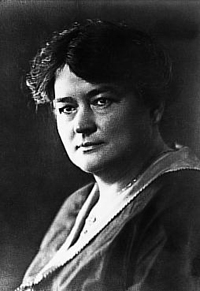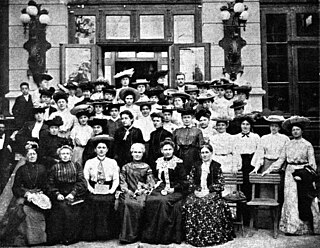
Eva Pawlik was an Austrian figure skater, show star, actress and commentator. She was the 1948 Olympic silver medalist, the 1948 World silver medalist, and the 1949 European champion.

Olga Wisinger-Florian was an Austrian impressionist painter, mainly of landscapes and flower still life. She was a representative of the Austrian "Stimmungsimpressionismus", a loose group of Austrian impressionist painters that was considered avant-garde in the 1870s and 1880s.

Rosa Mayreder was an Austrian freethinker, author, painter, musician and feminist. She was the daughter of Marie and Franz Arnold Obermayer who was a wealthy restaurant operator and barkeeper.

Adelheid Popp was an Austrian feminist and socialist who worked as a journalist and politician.

Grete Wiesenthal was an Austrian dancer, actor, choreographer, and dance teacher. She transformed the Viennese Waltz from a staple of the ballroom into a wildly ecstatic dance. She was trained at the Vienna Court Opera, but left to develop her own more expressive approach, creating ballets to music by Franz Schreker, Clemens von Franckenstein, and Franz Salmhofer, as well as dancing in her own style to the waltzes of Johann Strauss II. She is considered a leading figure in modern dance in Austria.
Helene Migerka was an Austrian poet and novelist. She was a daughter of the Austrian feminist and writer Katharina Kämpffat and museologist Franz Migerka (1828–1915).
Sophie Ritter von Scherer was an Austrian writer.
The League of Jewish Women in Germany was founded in 1904 by Bertha Pappenheim. Pappenheim led the JFB throughout the first twenty years of its existence, and remained active in it until her death in 1936. The JFB became increasingly popular through the 20th century. At its peak in 1928, the organization had 50,000 members from 34 local branches and 430 subsidiary groups. At the time, the JFB was Germany's third largest Jewish organization, with 15-20% of Jewish women in Germany becoming members.

Stefanie Nauheimer was an Austrian feminist and teacher.

Leopoldine Kulka was an Austrian writer and editor. As editor of Neues Frauenleben she controversially met women from combatant countries at the 1915 Women's conference at the Hague.

Therese Schlesinger, née Eckstein, was an Austrian feminist and politician.

Regine Ulmann née Kohn (1847–1938), also known by her pen names Gertrud Bürger and Agnes Thai, was an Austrian school director, editor and feminist. An active member of the Jewish women's movement, in 1866 she was one of six women who founded the Mädchen Unterstutzungs-Verein, later becoming the director of the association's training schools for poor Jewish girls.

The Allgemeiner Österreichischer Frauenverein was an Austrian women's organization for women's suffrage, active between 1893 and 1919.
Ines Rieder was an Austrian author, political scientist and journalist.

Marie Lang was an Austrian feminist, theosophist and publisher. Born in 1858 in Vienna, Lang was raised in a liberal, upper-middle-class home. After divorcing her first husband in 1884, she married Edmund Lang and the two hosted an influential salon for politicians and intellectuals. Joining the women's movement toward the end of the 1880s, she quickly became an influential women's rights activist. In 1893, along with Auguste Fickert and Rosa Mayreder, she founded the Allgemeiner Österreichischer Frauenverein. In spite of provisions in Section 30 of the law governing associations, which prohibited women's political involvement, the three friends used their networks of influential politicians and intellectuals to press for legal changes in laws governing women and children's civil rights and in favor of women's suffrage. In 1898, she co-founded the women's journal Dokumente der Frauen, serving as its editor-in-chief until 1902.
Ariadne is an information and documentation center on women/gender hosted by the Austrian National Library in Vienna. Ariadne was founded by Christa Bittermann-Wille and Helga Hofmann-Weinberger in 1992 with the aim of facilitating study on gender and women. It provides a digital interface for locating information by and about women. The center is located at Josefsplatz 1, A-1015 in Vienna, which is the address of the Austrian National Library, and does not offer a separate facility for women's research.

Irma Troll-Borostyáni was an Austrian writer, journalist and campaigner for women's rights.
Neues Frauenleben was a socialist feminist magazine which was published in Vienna, Austria, in the period 1902–1917. It was the official organ of the General Austrian Women’s Organization.

Yella Hertzka was an Austrian women's rights and peace activist, school director, and music business executive. She began working in women's humanitarian and social improvement projects in 1900. Co-founding the Neuer Wiener Frauenklub in 1903, she served as its president from 1909 to 1933. From 1904 she participated in the international women's rights movements, supporting women's suffrage and pacifism. In 1919, she attended the Zürich congress of the Women's International League for Peace and Freedom (WILPF). She was a co-founder of the Austrian section of the WILPF, organized its 1921 Vienna Congress, and attended every international WILPF congress held between 1919 and 1948. She worked to free prisoners of war after World War I and during World War II helped those wanting to emigrate or oppose the draft.

Helene Scheu-Riesz was an Austrian women's rights activist, pacifist, children's writer and publisher. In addition to supporting the Austrian women's movement, in November 1900 together with Yella Hertzka and three others she founded the Viennese Women's Club. She later became active in the Women's International League for Peace and Freedom, representing Austria at the organization's 1919 international congress in Zürich, the 1921 congress in Vienna and the 1924 congress in Washington, D.C. Scheu-Riesz took a special interest in children's literature, translating and writing books herself and founding the publishing house Sesam-Verlag in 1923. After the death of her husband, the Austrian intellectual and social democrat politician Gustav Scheu, as she was of Jewish heritage, in 1937 she moved to the United States. There she created the publishing house Island Press on the remote Ocracoke Island. She founded Open Sesame Inc. New York in 1949 to continue her philanthropic work of distributing world literature as a means of promoting internationalism and peace. In 1954, she returned to her house in the Hietzing district of Vienna where she spent the remainder of her life.















